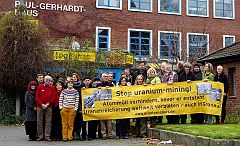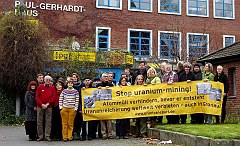Münster, Germany, 30 November 2014 - - At a two-day meeting here around 50 anti-nuclear activists from Russia, France, The Netherlands and from across Germany demanded an immediate end to the countless transports of uranium which ensure nuclear operations in Europe and elsewhere round the world.
They also demanded an end to uranium mining and processing everywhere. They demanded that the German government close down uranium enrichment in Gronau and production of nuclear fuel in Lingen.
Both factories are not included in the shutdown of nuclear power production planned for Germany and supply power stations around the world.
The conference participants intensively discussed the considerable dangers created by the mostly secret uranium transports.
They tracked them from mining in Kazakhstan and Uzbekistan through Russia across the Baltic Sea through the Kiel Canal to the central uranium transportation hub in the port of Hamburg.
From there the uranium concentrate rolls by train through Lower Saxony, Bremen, North-Rhine Westphalia and the Mosel/Saar region for processing in Narbonne-Malvési and Pierrelatte in southern France.
As uranium hexafluoride it then moves back to Germany for enrichment in Gronau or not far into The Netherlands at the same kind of plant at Almelo.
The next step is the Areva fuel production in Lingen, before the final products often move again through Hamburg or also Rotterdem to all over the world.
The conference condemned as unacceptable that in many ways France, Germany, Russia and The Netherlands continue to enable a future for the nuclear industry.
The activists also demand determined action from the German state governments to stop the growing number of uranium transports which endanger countless people.
Criticised especially for their inaction were the governments of Hamburg, Lower Saxony and North-Rhine Westphalia. Affected local governments were also called on to proactively campaign against secret uranium transports.
The conference welcomed the many protests against the transports this year, which included a summer camp in Kiel as well as hours-long blockades of transports in Hamburg and the fuel factory in Lingen. There were also protests among others in Gronau, Osnabrück, Münster, Cologne, and Trier.
The participants also criticised that for the uranium waste aggregating worldwide – like all other nuclear waste – there is no safe final disposal.
Already in the mining countries massive amounts of uranium waste aggregate.
For Gronau there are plans to start operating a huge new uranium waste dump for 60,000 tonnes of uranium oxide next year, without a time limit. Participants especially rejected this endless storage in Gronau.
The planned sale of the uranium enricher Urenco on the world market is irresponsible because uranium enrichment is the easiest path to the atom bomb. Only the immediate ending of uranium enrichment is acceptable.
Up to 2009 27,000 tonnes of uranium waste went from Gronau to Russia. The transportation was illegal. In 2006 Russian environment activists filed a criminal suit against the Gronau operator.
Only a few weeks ago the German government admitted reluctantly that it really was nuclear waste that went to Russia, not “valuable recyclable material” as claimed by Urenco. So far the German government refuses to take any responsibility for the German waste dumped in Russia.
A Russian female activist from Ekaterinburg revealed to the conference that they would again ask the public prosecutor in Münster to investigate the illegal waste transport from Gronau to Russia.
The participants sharply condemned attempts by the Russian government through repressive laws to brand Russian environment and human rights organisations as “foreign agents”. The Ecodefense group is currently under threat of enforced disbandment.
The conference demanded respect for the very committed work of the non-governmental organisations and to protect them. It called for solidarity with Ecodefense.
The conference ended on 30 November with protests outside the Gronau and Lingen plants.
In Lingen a woman representing the French anti-nuclear umbrella organisation, Réseau “Sortir du nucléaire” called for immediate closure of the Areva fuel factory. Areva is a globally operating French corporation.
Areva currently has big financial problems and the Lingen operations had to be downsized some weeks ago because of serious technical problems.
The activists announced more joint protects against uranium transportation and the uranium industry as a whole.
More information in German at www.urantransport.de, www.sofa-ms.de, www.robinwood.de, www.wise-uranium.org, www.umweltfairaendern.de
Pictures of the conference at
http://www.anti-atom-aktuell.de/fotos/20141129-internationales-urantrans...



Comments
The filthy tricks behind splitting German nuclear power producer
The filthy tricks behind splitting German nuclear power producer
By Jochen Stay
Jochen Stay, born 1965, has been active in non-parliamentary movements since he turned 15. Since 1985 public protests stopped a nuclear fuel processing plant being built in Wackersdorf, Bavaria, he’s been an anti-nuclear activist. Since 2008 he’s been the spokesman for the anti-nuclear group, .ausgestrahlt.
Some praise Eon for apparently abandoning its nuclear and coal business and announcing it’s witching to renewable energies in future. But they overlook what’s really driving this splitting into two enterprises.
The outsourcing of nuclear and coal power production under a new name does not lead to Eon customers having less dirty energy delivered to their homes in future. The then make-believe-green company will continue to buy from the new sister company. It’s just not as obvious – and hence less bad for the image.
In future the Eon logo will no longer be on the coal and nuclear power stations, even though Eon will remain the biggest buyer of the power they produce. It’s a way of keeping customers who don’t want to trade with firms directly co-responsible for nuclear waste and the climate catastrophe. This kind of thing is normally called label fraud or greenwashing.
And so it’ll be harder in future to persuade Eon customers to change to other suppliers, seeing that their present one, after all, has become totally green.
When the company publishes numbers that put the self-produced green power in the foreground but hide the bought-in dirty power, a completely false impression will be created in consumers. And the negative headlines about mishaps in power stations, legal action against stopping nuclear power and nuclear waste scandals will then be pasted on the new no-name company, which will be owned by the same shareholders as ever.
The outsourced dirty power department can then act totally without scruples because it no longer has to worry about its reputation – after all, it doesn’t supply any consumers directly.
Eon chief Johannes Teyssen is already wooing investors to the new entity with prospects of billions in compensation legal action is attempting to pry from the government because it ordered closure of a few old nuclear power stations in 2011.
There’s another dangerous background to the splitting of the Düsseldorf based energy giant: in future Eon can no longer be made liable for the costs that will accrue for the dismantling of power stations and the storage of nuclear waste. The reserves set aside for these activities, which fall far short of what will be needed, will pass together with the stations to the new enterprise.
Since these reserves aren’t kept in a bank safe or a fixed term account somewhere, but are invested in coal stations, for example, that are becoming ever less profitable because of the energy turnaround, even many of these very inadequate funds are in danger of being lost.
Sooner or later the new corporation will fall bankrupt and the state will have to shoulder the burden, while Eon, freed of old burdens, can happily continue raking in profits by passing coal and nuclear power to unsuspecting consumers.
This is how this Eon outsourcing under a new name will quasi become a “bad company” – analogous to a “bad bank” in the finance crisis: everything that isn’t profitable in the long term is shoved off into state responsibility.
The fact that the federal economics minister, Sigmar Gabriel, welcomes the Eon split in this situation and claims that the reserves are both secure and adequate is scandalous.
Instead, the federal government must block Eon’s plans and ensure that those who for decades made billions from nuclear and coal power have to pay for the consequences.
Machines have to be restored instead of being scrapped
Machines like cars, trucks & alot of other machines could be repaired & treated like the sydney harbour bridge & restored classic cars, that way machines don't have to be wrecked, scrapped & re-furnaced at the steel plant. Renewable energy also will help as well
https://indymedia.org.au/2014/06/03/a-new-direction-for-renewable-energy
https://indymedia.org.au/files/renewable.pdf